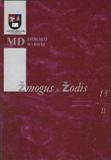Nepelnytai užmirštas Motiejaus Strijkovskio kūrinys
Undeservedly Forgotten Work by Maciej Stryjkowski
Author(s): Eglė PatejūnienėSubject(s): Literary Texts
Published by: Vytauto Didžiojo Universitetas
Keywords: Renaissance; Turcica; Ottoman Empire; Turkish threat; Christian world; Christian Europe; ambivalent attitude
Summary/Abstract: The article aims to introduce the reader with an almost unknown work by otherwise very wellknown writer, the author of the first printed history of Lithuania (1582), Maciej Stryjkowski. In 1575 he published a poem, written in Polish thirteensyllable verses, untitled (in short) About the liberty of the Kingdom of Poland and the Great Duchy of Lithuania. At first glance, this book is a rather typical example of 16th–18th century European literature of many different genres (the so-called Turcica), dealing with complex relationship between the Christian world and the Ottoman Empire. As a true Renaissance man, the author is obviously very proud of his knowledge gained from personal experience: at the time the book was published, he had recently returned from Stambul, which he had visited as a member of Polish diplomatic mission. Being an ex-soldier and scout, Stryjkowski not only calls all Christians to join their forces against the Turkish threat, but also suggests a very pragmatic and explicit military action program. At every opportunity, he admonishes Polish and Lithuanian nobility to prepare themselves for an inevitable war with the Ottomans and encourages them to defend their famous liberty, as a greatest privilege in the world. On the other hand, in several places of his work he almost glorifies Turkish discipline, moderation, equality of rights (thus reflecting an ambivalent attitude to Ottoman Empire, characteristic for Christian Europe of that time), and alludes that the noblemen and the upper clergy of the countries occupied by Turks, actually deserve their suffering for their previous arrogance and selfishness. For that matter, the discussed poem by Stryjkowski may be compared to political and sociological works by prominent Lithuanian thinkers of 16th century Michalo Lituanus and Andreas Volanus.
Journal: Žmogus ir žodis
- Issue Year: 15/2013
- Issue No: 2
- Page Range: 16-29
- Page Count: 14
- Language: Lithuanian

